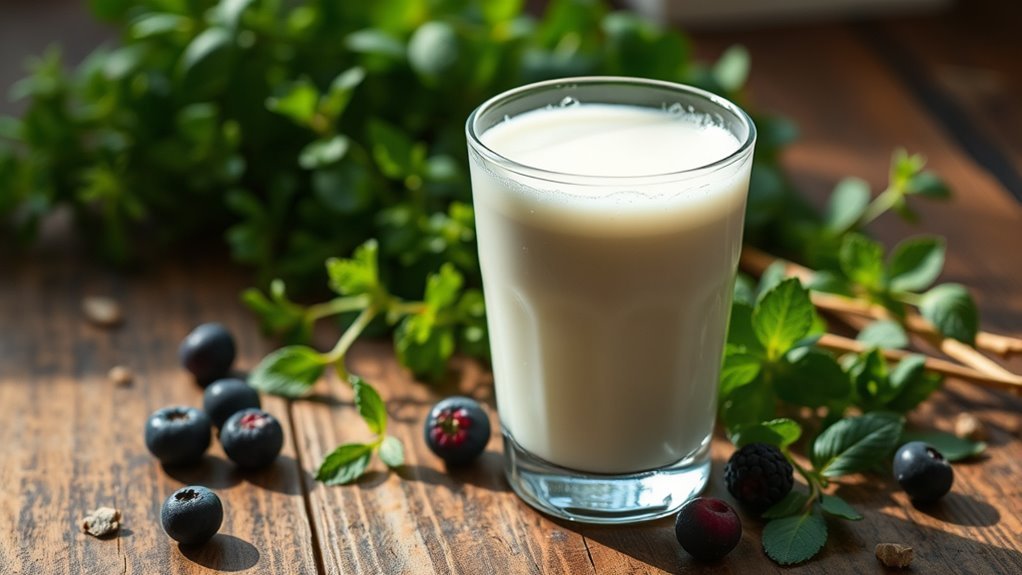Kefir can be keto-friendly, but it’s essential to choose the right type. Look for full-fat versions with under 5 grams of net carbs per serving. Dairy kefir is richer in protein and fat, making it more suitable for keto compared to water kefir, which often contains more sugars. Prioritize plain, unsweetened options to avoid added sugars. By making smart choices, you can enjoy kefir’s probiotic benefits while staying on track with your keto goals. You’ll discover more tips and insights ahead.
Understanding Kefir: What It Is and How It’s Made

Kefir is a tangy, fermented drink that’s often likened to yogurt but boasts a thinner consistency. Its origins trace back to the Caucasus Mountains, where locals discovered that milk fermented with kefir grains created a probiotic-rich beverage. These grains, a combination of bacteria and yeasts, are essential for fermentation techniques that transform milk into kefir. This process involves adding the grains to milk, allowing it to ferment at room temperature for about 24 hours. The result is a creamy, effervescent drink packed with beneficial probiotics. Understanding kefir’s origins and fermentation techniques can deepen your appreciation for this unique beverage, providing insight into its health benefits and versatility in your diet.
Nutritional Breakdown: Carbohydrates in Kefir

When evaluating whether kefir fits into a keto diet, it’s essential to examine its carbohydrate content. Typically, a cup of plain kefir contains around 10-12 grams of carbs, which can affect your daily carb limits. Here are some key points to take into account:
- Lactose: The primary carbohydrate in dairy kefir, which may be reduced during fermentation.
- Sugar: Added sugars can greatly increase carb content; opt for unsweetened varieties.
- Kefir Alternatives: Explore options like coconut or almond milk kefir, which often have lower carbs.
- Serving Size: Adjusting your portion can help you manage carb intake while enjoying kefir.
Understanding these carbohydrate sources can help you make informed choices in your keto journey.
Types of Kefir: Dairy vs. Water Kefir

When considering kefir, it’s important to understand the differences between dairy and water kefir. Each type has distinct nutritional profiles and varying carbohydrate content, which can impact your keto diet. Additionally, the fermentation processes for these two kefirs are different, influencing their flavors and health benefits.
Nutritional Profiles Explained
While both dairy and water kefir offer unique health benefits, their nutritional profiles differ greatly and can impact their suitability for a keto diet. Here’s a quick comparison:
- Dairy Kefir: Typically higher in protein and fat, making it a rich source of nutrients.
- Water Kefir: Generally lower in calories, but it can have more sugars, depending on the fermentation process.
- Kefir Flavors: Dairy kefir often has a creamy, tangy flavor, while water kefir can be more invigorating with fruity notes.
- Kefir Recipes: Both types can be used in various recipes, but dairy is better for smoothies, while water kefir shines in revitalizing drinks.
Understanding these differences can help you choose the right kefir for your keto lifestyle.
Carbohydrate Content Comparison
Carbohydrate content plays an essential role in determining whether kefir fits into your keto diet. Dairy kefir typically contains around 6-12 grams of carbs per cup, depending on the fermentation process and fat content. On the other hand, water kefir is often lower in carbs, usually around 2-5 grams per cup, making it a more appealing choice for those strictly monitoring their carb intake. If you’re seeking keto snacks that align with your dietary goals, water kefir can serve as a invigorating beverage or carb alternative. However, if you enjoy the taste and benefits of dairy kefir, consider consuming it in moderation. Balancing your choices can help you enjoy kefir while staying within your keto limits.
Fermentation Process Differences
Although both dairy and water kefir undergo fermentation, the processes and cultures involved yield distinct nutritional profiles and health benefits. Understanding these fermentation techniques helps you choose the right kefir variety for your lifestyle.
Here are some key differences:
- Base Ingredient: Dairy kefir is made from milk, while water kefir uses sugar water or fruit juice.
- Microbial Cultures: Dairy kefir contains specific bacteria and yeast, while water kefir features a different mix, often resulting in lower calories.
- Flavor Profile: Dairy kefir has a tangy taste, whereas water kefir is usually sweeter and fruitier.
- Nutritional Content: Dairy kefir is rich in protein and calcium, while water kefir is typically lower in nutrients but hydrating.
These factors can impact your keto journey.
The Role of Probiotics in a Keto Diet
How do probiotics fit into a keto diet? Probiotics, particularly specific probiotic strains, play an important role in maintaining a healthy gut microbiome. On a keto diet, your body undergoes significant metabolic changes, and incorporating probiotics can help support digestion and nutrient absorption. A balanced gut microbiome is fundamental for overall health, especially when limiting carbohydrates. Probiotics may also assist in reducing digestive discomfort that some experience during the initial phase of keto. They can enhance immune function and promote a sense of well-being, which is critical for sustaining your keto lifestyle. By including probiotic-rich foods or supplements, you can nurture your gut health while enjoying the freedom that a keto diet offers.
How to Incorporate Kefir Into Your Keto Meal Plan
Incorporating kefir into your keto meal plan can be a delicious way to enhance your diet while reaping the benefits of probiotics. Here are some creative ways to add kefir to your meals:
- Kefir Smoothies: Blend kefir with low-carb fruits like berries for a revitalizing breakfast or snack.
- Kefir Salad Dressing: Use kefir as a base for a tangy salad dressing by mixing it with herbs and olive oil.
- Marinades: Combine kefir with spices and use it to marinate chicken or fish, adding flavor and tenderness.
- Overnight Oats: If you’re not strictly keto, mix kefir with chia seeds for a nutritious overnight breakfast option.
These ideas can help you enjoy kefir while staying on track with your keto lifestyle!
Potential Health Benefits of Kefir on a Ketogenic Diet
Kefir is packed with nutrients, making it a great addition to your ketogenic diet. Its rich probiotic content can support gut health, which is essential for overall well-being. By incorporating kefir, you may enhance your nutrient intake while benefiting your digestive system.
Nutrient Density of Kefir
While many dairy products may not align with a ketogenic diet, kefir stands out due to its impressive nutrient density. This fermented drink offers several kefir benefits that enhance nutrient absorption and overall health. Here are four key nutrients you’ll find in kefir:
- Protein: Supports muscle repair and growth, essential on a keto diet.
- Calcium: Fundamental for bone health, it helps maintain strong bones.
- B Vitamins: Critical for energy production and metabolic processes.
- Magnesium: Aids in muscle function and supports a healthy heart.
Incorporating kefir into your keto lifestyle can enhance nutrient intake while keeping carbs low. Its rich profile can help you thrive without sacrificing your dietary goals.
Probiotics for Gut Health
How can probiotics from kefir support your gut health on a ketogenic diet? Kefir is packed with beneficial probiotic strains that can enhance your gut microbiome. These strains help maintain a balance of good bacteria, which is essential, especially when following a low-carb diet that may alter your digestive health. Research suggests that a healthy gut microbiome can improve digestion, boost immunity, and even support weight management. Incorporating kefir into your keto lifestyle not only satisfies your taste buds but also nourishes your gut. By promoting a diverse microbiome, kefir helps your body adapt to dietary changes, ensuring you feel your best while enjoying the freedom of a ketogenic diet. Embrace the probiotic power of kefir for peak gut health!
Tips for Choosing Keto-Friendly Kefir Products
When you’re on a keto diet, selecting the right kefir products can be a bit tricky, but knowing what to look for can make the process easier. Here are some tips to guide your choices:
- Check Net Carbs: Look for kefir brands with low net carbs, ideally under 5 grams per serving size.
- Read Ingredients: Choose products with minimal ingredients. Avoid added sugars and artificial flavors.
- Opt for Full-Fat Versions: Full-fat kefir is more keto-friendly as it aligns with your dietary fat goals.
- Consider Probiotic Content: Confirm the kefir contains a variety of probiotics to support gut health while you enjoy the freedom of your keto lifestyle.
Frequently Asked Questions
Can I Make My Own Keto-Friendly Kefir at Home?
Absolutely, you can make your own homemade kefir at home! The fermentation process involves adding kefir grains to milk or a non-dairy alternative, allowing it to ferment for 24 hours. This way, you can control the ingredients and guarantee it fits your dietary needs. Just keep in mind that the type of milk you choose will affect the final carb content, so opt for low-carb options if you’re aiming for a keto-friendly version.
How Does Kefir Compare to Yogurt on a Keto Diet?
When it comes to kefir and yogurt, it’s like comparing apples to oranges. Both offer unique benefits, but kefir’s probiotic content often surpasses yogurt’s, promoting gut health. Yogurt typically has fewer carbs, which might appeal to your keto goals. However, kefir can still fit within your diet if you’re mindful of portions. Ultimately, choosing between them depends on your taste preferences and nutritional needs, so you can enjoy freedom in your choices.
Is Flavored Kefir Suitable for a Ketogenic Lifestyle?
Flavored kefir can be tricky for a ketogenic lifestyle. While it offers probiotics and benefits, many flavored options contain added sugars, which can kick you out of ketosis. If you’re seeking keto alternatives, consider plain kefir instead, as it usually has lower carbs. Always check the labels to verify you’re making the best choice. Remember, staying informed about your options lets you enjoy your diet while still maintaining your health goals.
What Are the Best Brands of Keto-Friendly Kefir?
You might think all kefir is high in carbs, but there are low-carb options out there. When searching for the best keto-friendly kefir brands, look for those with minimal added sugars. Some popular choices include Lifeway’s Plain Kefir and Green Valley Creamery’s lactose-free version, both low in carbs. Always check the nutrition label to guarantee it fits your dietary needs, giving you the freedom to enjoy this probiotic-rich drink without guilt.
Can Kefir Help With Keto Flu Symptoms?
Kefir can potentially help with keto flu symptoms due to its probiotic benefits. As you adjust to a ketogenic diet, your gut health may suffer, leading to discomfort. Kefir’s probiotics can support digestion and improve gut flora, which may alleviate some of those flu-like symptoms. Additionally, its hydrating properties can help combat fatigue and headaches often experienced during this change. Incorporating kefir into your routine could provide much-needed relief as you adapt.
Frequently Asked Questions about Kefir and Keto
1. Is kefir low in carbohydrates?
Kefir tends to be lower in carbohydrates than regular milk because the fermentation process breaks down some of the sugars. On average, a 1-cup serving of unsweetened plain kefir contains about 6-10 grams of carbohydrates. However, it’s essential to check the label for any added sugars that might increase the carb count, especially in flavored varieties.
2. Can I include kefir in my ketogenic diet?
Yes, kefir can be included in a ketogenic diet, but moderation is key. Due to its probiotic content and nutritional benefits, it can be a healthy addition. Aim for plain, unsweetened kefir to keep the carbohydrate intake low, and consider adjusting other carb sources in your meals to stay within your daily limits.
3. What are the health benefits of kefir on a keto diet?
Kefir is rich in probiotics, which can support gut health, enhance digestion, and improve nutrient absorption—important factors when following a keto diet that may be low in fiber. Additionally, kefir is a good source of calcium, protein, and B vitamins, which can help maintain overall health during a low-carb lifestyle.
4. How can I use kefir in keto recipes?
Kefir can be versatile in keto recipes. Use it as a base for smoothies, salad dressings, or marinades. You can also add it to soups for a creamy texture or use it in baking to replace buttermilk in low-carb recipes. Just be mindful of the total carbohydrates in your recipe to ensure it fits your keto goals.
5. Are there any alternatives to kefir for keto diets?
Yes, there are several alternatives to kefir suitable for keto diets. Unsweetened Greek yogurt, coconut yogurt, and almond milk yogurt are great options, as they typically have lower carbohydrate content. Additionally, you can consider using probiotic supplements if you’re looking for gut health benefits without the carbs associated with dairy.
References
- https://www.healthline.com/nutrition/kefir-keto-friendly
- https://www.ncbi.nlm.nih.gov/pmc/articles/PMC6470860/
- https://www.webmd.com/diet/what-to-know-about-kefir
- https://www.medicalnewstoday.com/articles/323295
- https://www.ncbi.nlm.nih.gov/pmc/articles/PMC5632394/
- https://www.dietitians.ca/Your-Health/Nutrition-Articles/Kefir-What-is-it-and-what-are-the-benefits.aspx
- https://www.journalofclinicalpathways.com/journal/jcp/article/what-kefir-and-why-should-you-drink-it
- https://www.rd.com/article/kefir-benefits/


